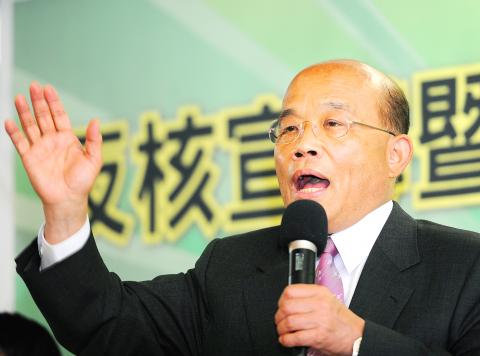Democratic Progressive Party (DPP) Chairman Su Tseng-chang (蘇貞昌) yesterday repeated his call for President Ma Ying-jeou (馬英九) to “fulfil the people’s expectations” by issuing a direct executive order to suspend construction of the Fourth Nuclear Power Plant in New Tapei City’s (新北市) Gongliao District (貢寮).
The anti-nuclear movement has been “a national campaign which transcends competition between political parties and is more than a political issue,” Su told an anti-nuclear symposium organized by the DPP’s Democracy Institute, citing strong public support for the movement against finishing the plant’s construction.
By ordering the suspension of the plant’s construction, the nation would be able to take advantage of the global economic recovery and revive its own economy, Su said.

Photo: Fang Pin-chao, Taipei Times
A public opinion survey conducted by the DPP’s Poll Center showed that more than 70 percent of respondents — 60 percent of which identified themselves as pan-blue camp supporters — favored suspending the project.
It would be a waste of time and government resources to spend the remainder of the year debating a national referendum to decide the fate of the plant, Su said.
The DPP chairman said that Ma was misleading the people by saying that issuing an executive order to halt constrcution of the plant would be unconstitutional because the Constitutional Court’s grand justices said legislative approval would be the legal basis for suspension.
The DPP has no intention of making the issue a competition against the Chinese Nationalist Party (KMT), the chairman said.
If the KMT insists on proceeding with its national referendum proposal, the DPP would have no choice but to engage in a “referendum war” and try to mobilize more than 9 million voters to participate in the poll, Su said.
“Never underestimate the power of the people and their determination to stop the construction of the nuclear power plant,” Su said.

‘DENIAL DEFENSE’: The US would increase its military presence with uncrewed ships, and submarines, while boosting defense in the Indo-Pacific, a Pete Hegseth memo said The US is reorienting its military strategy to focus primarily on deterring a potential Chinese invasion of Taiwan, a memo signed by US Secretary of Defense Pete Hegseth showed. The memo also called on Taiwan to increase its defense spending. The document, known as the “Interim National Defense Strategic Guidance,” was distributed this month and detailed the national defense plans of US President Donald Trump’s administration, an article in the Washington Post said on Saturday. It outlines how the US can prepare for a potential war with China and defend itself from threats in the “near abroad,” including Greenland and the Panama

The High Prosecutors’ Office yesterday withdrew an appeal against the acquittal of a former bank manager 22 years after his death, marking Taiwan’s first instance of prosecutors rendering posthumous justice to a wrongfully convicted defendant. Chu Ching-en (諸慶恩) — formerly a manager at the Taipei branch of BNP Paribas — was in 1999 accused by Weng Mao-chung (翁茂鍾), then-president of Chia Her Industrial Co, of forging a request for a fixed deposit of US$10 million by I-Hwa Industrial Co, a subsidiary of Chia Her, which was used as collateral. Chu was ruled not guilty in the first trial, but was found guilty

A wild live dugong was found in Taiwan for the first time in 88 years, after it was accidentally caught by a fisher’s net on Tuesday in Yilan County’s Fenniaolin (粉鳥林). This is the first sighting of the species in Taiwan since 1937, having already been considered “extinct” in the country and considered as “vulnerable” by the International Union for Conservation of Nature. A fisher surnamed Chen (陳) went to Fenniaolin to collect the fish in his netting, but instead caught a 3m long, 500kg dugong. The fisher released the animal back into the wild, not realizing it was an endangered species at

DEADLOCK: As the commission is unable to forum a quorum to review license renewal applications, the channel operators are not at fault and can air past their license date The National Communications Commission (NCC) yesterday said that the Public Television Service (PTS) and 36 other television and radio broadcasters could continue airing, despite the commission’s inability to meet a quorum to review their license renewal applications. The licenses of PTS and the other channels are set to expire between this month and June. The National Communications Commission Organization Act (國家通訊傳播委員會組織法) stipulates that the commission must meet the mandated quorum of four to hold a valid meeting. The seven-member commission currently has only three commissioners. “We have informed the channel operators of the progress we have made in reviewing their license renewal applications, and